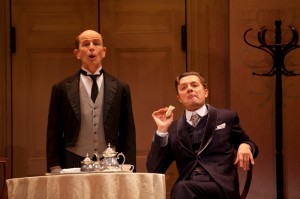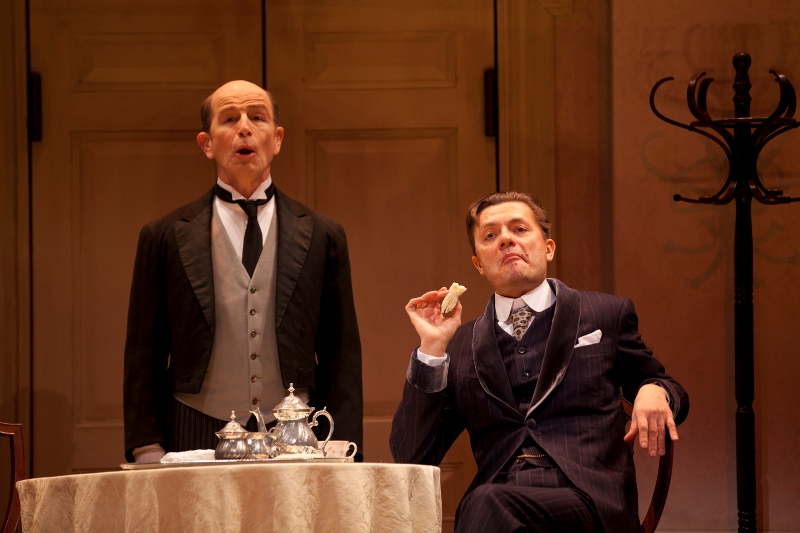
Everett Quinton and James Urbaniak in a scene from TRAVESTIES, running at McCarter Theatre Center in Princeton, NJ through April 1. (Photo credit: T. Charles Erickson)
“Why is this play titled as it is?” asked a good friend. “A travesty is a shameful injustice, a mockery. What are the injustices here?”
He was a bit mistaken. Where the word “travesty”, in its common use, is very often followed by the thought “of justice,” either spoken or implied, the art of travesty began as a genre of Victorian entertainment wherein a famous literary or musical work was parodied in the comic extreme. So, while a travesty may turn out to be a shameful injustice, with any luck at all, it won’t.
With luck it will be Orphic in its instruction and delight. At the McCarter Theatre on Friday, March 16, we were dealt aces.
Why is this play called TRAVESTIES?
It is a fictionalized reflection of real events in Zurich at the end of World War I mixed with the reflected invention of an event in Zurich, 1974. Story protagonist Henry Carr, filled and delivered by veteran actor James Urbaniak with intelligence, wit and most flexible craft, was historically attached to the British consulate in Zurich at war’s end. Coincidentally, also in Zurich at the time, were James Joyce, Vladimir Lenin and Dada standard bearer Tristan Tzara.
The world of the play is Carr’s Zurich apartment at two times: first in 1974 where he sits in doting recollection then flashing to Zurich circa 1917 as he recollects it. Historically clear that Carr knew Joyce, it is not as clear that Carr interacted with all three notables to the degree which the play suggests. In the play, Carr remembers himself as their equal or better, engaging them with repartee lifted from Oscar Wilde. His world view, however, is not quite as broad as theirs.
Mr. Urbaniak deftly gives us a Carr as passionate about the haberdash as Joyce was about structure in art, Lenin about class struggle and Tzara about the random universe. The turns are riveting: there he is, a young buck standing on a chair passionately declaiming about green pants when a door slams.
Within the time it takes the reverberation to reach the back wall of the house and echo in return to the proscenium, the lights have changed, the set has changed and there sits Mr. Uraniak, the codger, in 1974. It is perfect and seamless craft in service of a rock-solid vision from an inferno of an intellect intent on prying our stubborn minds from their safe purchase.
Why is this play called TRAVESTIES?
The play is structured like memories. Things repeat. It is exactly the process of reconstructing past events from a distance of great time with the intention of having everything make sense. The mind combs the husks of dead events looking for the piece that will make it all feel right, and, not quite finding it, things repeat.
The play owes a debt to Oscar Wilde. Events intermingle. Gwendolyn and Cecily enter the scene, gifted to us by accomplished performers Susannah Flood and, in her McCarter debut, Sara Topham. They step straight from a Wilde drawing room into the playground of Carr’s memory. Did they exist? Perhaps. Or, perhaps, they simply slipped sideways from a Zurich stage into the Zurich streets of Carr’s mind.
Their presence in the play is comic in a cosmic spot which nears pain. Was a pretentious, liberal, upper-crust ditzy British twit really key in producing the revolutionary vision of Communism at its most vital? Ow, that hurts. And the parody they enact of Vaudeville’s Gallagher and Sheen routine is like a bucket of clear, bright water in the face. Where’d that come from, you say? Then, hmmm. Very funny and curiously refreshing.
Why TRAVESTIES?
Vladimir Lenin and his wife, Nadya Krupskaya are played with revolutionary passion in fervent Russian by Demosthenes Chrysan and Lusia Strus. They repeatedly stand in the Zurich library discovering the news that the revolution has begun and devising ways of returning to the Motherland.
Entering into the spirit of the thing, I might spend a paragraph praising their excellent diction with the unabashed admission that I know only three words of Russian and have been told by Russians that I pronounce them unintelligibly. As it stands, I will say that they were two most effective actors, completing clear transmission of intention and reflection without the unmitigated benefit of direct, linguistic communication. Nicely done.

James Urbaniak, Susannah Flood, Everett Quinton, Fred Arsenault, and Christian Coulson (in mid-air) star in TRAVESTIES at McCarter Theatre Center. (Photo credit: T. Charles Erickson)
Everybody stands on chairs and declaims. Christian Coulson, as Tristan Tzara, is perfect in his anti-ness. The syllable is “da”. And he captures the disgusted rage of the movement at the effete institutions which produced gross waste and destruction from human genius, conveying the distaste in the explosive utterance of that syllable like the spatter of a machine gun. Dadadadada. . .
Fred Arsenault as James Joyce is infused with the egotistical passion and arrogant confidence for which Joyce is famous and without which no one would ever have heard of him. He stands on the chair opposite to Mr. Coulson’s, declaiming modernism with jolting passion.
A. Percy Bennet, the English Consul General of Zurich and Carr’s superior, is portrayed with gracious irony by Everett Quinton. In his memory, Carr places Bennett as his own butler. Mr. Quinton gives us smarmy elegance which transposes seamlessly into homiletic insertions not quite at peace with the role of the butler and back to quiescence in a single cross of the stage. Again, excellence of craft. Again, seamless insertions.
Every actor in the cast deserves specific praise, mention and thanks. No one stands out. This may be as close to theatre heaven as it gets for anyone with an intellect.
From complex, coordinated cues to the gracious elegance of craft which allows actors and crew to illuminate the intellectual landscape of this play with clarity and ease, this performance is exactly what intelligent, professional theatre ought to be. This is no intellectual snack food. This is as thick and sweet as a New Orleans night in July. And we emerge hypnotized by the grandeur of it all. It is, in the end, very serious nonsense.
There should be a word for a production which fills the full intent of a play and then blooms to adorn it in great glory. Oh, right. The word is perfect. This is a perfect production.
You can quibble with the choices and emphases, but you cannot argue that the ones presented were anything but intellectually sound, imagined with satisfying artistry of vision and realized with a craft so developed and secure on all levels that even the stagiest of stage tricks was completely transparent and fully in service of the work.
This is not a play for everyone, although, to be fair, there seems a bit of something for all in it. I sat next to a 13-year-old patron who was rapt throughout. In the condescension of adultism, I assumed he hadn’t grasped the implications of the early 20th Century argument between traditional and abstract arts which had actually led to street brawls.
And perhaps he missed that. But he told me the play had an “exciting flow.” This took me aback. It had had a most exciting flow, and he’d noticed it before I did.
TRAVESTIES?
Every political, economic, artistic, romantic and culinary viewpoint presented in the play parodies every other viewpoint in some way, often in grotesque mockery.
But the central parody, the greatest travesty of the play, is the experience of being human itself . We have life, we have art, we have intellect, we have memory. And, at the end of a life, those assemblages roll and bump against each other so that the totality emerges as a triumphantly painful, well-defended and often grotesque reshuffled and mis-remembered parody of the real life lived.
Our lives may or may not be gross injustices. But by Stoppard’s standards, they will often end up as very funny travesties. See this play with someone who knows everything and watch her response afterward. Until then, I wish extremely pleasant mockeries to you all.
TRAVESTIES
by Tom Stoppard
Directed by Sam Buntrock
Through April 1, 2012
Matthews Theatre
McCarter Theate Center
91 University Place
Princeton, NJ
609.258.ARTS(2787)
http://www.mccarter.org/


